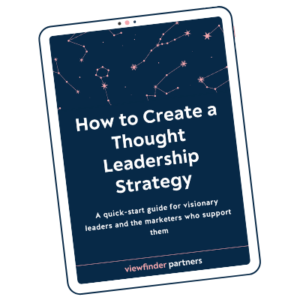“I want to pursue thought leadership as a strategy, but I’m a private person. I don’t want to spill my guts online.”
A friend asked me this question the other day: Can you be a thought leader and a “private” person?
My answer is a resounding YES.
Here’s why:
- Thought leadership is about sharing your work, not your whole life.
- Even if you’re a very “on” thought leader who is writing, podcasting, speaking, and sharing every single day, you can still do that while only sharing a very defined part of yourself. You can leave a lot behind closed doors.
If you’ve followed their work for years, you may feel like you “know” some of your favorite thought leaders. And you probably do know how they think, how they approach professional challenges, and what they’re like to work with. But they could have achieved that intimacy and openness without sharing a-n-y-t-h-i-n-g about their personal lives.
Think about someone you know only through their thought leadership — a person whose work you follow but whom you don’t “know” personally. How much do you know about their romantic relationships? Their family? Their medical history? The answer is probably…almost zero. Because they’ve figured out how to be personable (a person you feel like you know) without getting personal.
Examples of thought leadership that’s personable without getting personal
Consider these examples for inspiration and proof that you can put yourself out there without sharing personal details.
Ann Handley
Ann Handley is an extremely popular thought leader who writes and speaks about B2B writing. Her newsletter is funny, chummy, and full of good ideas and juicy examples. Her tone is intentionally casual (she opens her newsletter to more than 50,000 subscribers with “Hey, bestie”). She talks about her office (a shed in her backyard), her writing process, the typewriter she recently brought home, and her dog. I’ve been reading Ann’s newsletter for years, I have her book on my shelf, and I’ve seen her deliver hour-long keynotes. I feel like I know her and her sensibilities about her work.
But I know almost nothing about her family, politics, or life story outside her career. Because none of those things are relevant to Ann’s thought leadership platform. Ann is a really good example of someone who has built a following by being personable without getting personal.
Adam Grant
Adam Grant has sold millions of books, charmed many with his TED Talks, and hosts a highly-rated podcast. He is a go-to thinker in organizational psychology. Again, I’ve learned a lot from Adam’s work. But I know essentially nothing about his life outside of work, and it feels like that’s probably by design. He comes off as friendly and full of ideas, even while he chooses not to share much about his personal life.
Simon Sinek, James Altucher, Daniel Golman, Sallie Krawcheck, etc. etc. etc.
I looked through a list of top LinkedIn influencers and couldn’t find anyone who has built their platform by gushing about their personal lives.
In my own thought leadership, I share examples of client projects, talk through my approach, and reflect on mistakes and lessons learned. Sometimes I mention in passing that I have children. You can probably figure out what part of the world I live in, but I don’t focus on it. I almost never talk about my marriage or even whether I am married. There are major parts of my daily life that I’ve never discussed on LinkedIn or written about publicly. I’ve managed to write online for the past ten years without revealing much at all about my life beyond my work. You can be private about your private life while still sharing generously in public about your work life.
None of this is to say that you should leave your personal life at the door or live a Severance-style life, with your “outside of work” self divorced from your “serious thought leader” persona. Of course, we’re all full, complex humans, and our relationship with work is interwoven with our relationship with other parts of our lives. Personal stories and examples are always helpful in thought leadership, but you don’t have to explore touchy, delicate, or private parts of your life if you don’t want to.
And if you’re still worried about sharing too much or “spilling your guts,” try the trick I use with professionals in highly regulated or conservative industries (law firms, I’m looking at you): If you don’t want to share any personal details, tell us about your dog. Everyone loves dogs, including yours, and no one will get mad at you for sharing about your dog on the internet.







